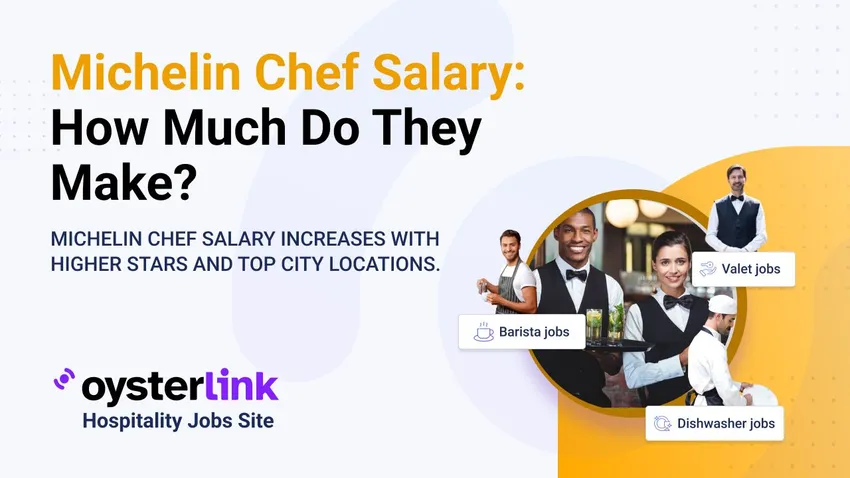Michelin Chef Salary: Key Takeaways
- Michelin Chef salary increases with the number of stars a restaurant holds.
- Location affects pay, with Chefs in major cities like New York or Tokyo earning higher salaries.
- Many Michelin-star Chefs increase their income through TV, books, endorsements and brand deals.
There’s no universal answer to the Michelin Chef salary question. As in any industry, earnings depend on factors like experience, location and restaurant success — and that’s exactly what we’re diving into today.
Factors Influencing Michelin Chef Salary
There are many different factors that influence how much a Michelin-star restaurant Chef makes. Their status in the kitchen is arguably what makes the most difference.
An Executive Chef will make the most amount of money, followed by the Head Chef. Head Chefs have an average salary of $73,632 per year in the United States.
This number can be significantly higher for Michelin-star Head Chefs. An Executive Chef and Chef de Cuisine have the most experience and hold the most responsibilities in the kitchen.
After them come Sous Chefs. The average salary for a Sous Chef in the U.S. is $56,013 per year. A Sous Chef is second in command in professional kitchens.
As such, they're responsible for keeping track of kitchen inventory, scheduling and ensuring all work stations are operating smoothly.
Hierarchy is key, salaries rise with rank and responsibility in Michelin-starred kitchens.
Next in line is the Chef de Partie, also known as the Line Cook. The average salary for Line Cooks in the U.S. is $33,829 per year. Line Cooks are in command of specific workstations, such as the vegetable, pastry, grill, fry and so on.
Last in line are the Commis Chefs. These Chefs work in a specific workstation under the Chef de Partie. Some examples of Commis Chefs are Pastry Chefs, Vegetable Chefs, Grill Chefs, Fry Chefs and Sushi Chefs.
The salaries of these positions can vary greatly. For instance, the average salary of a Pastry Chef in the U.S. is $54,995, whereas the average salary of a Sushi Chef is $58,909 a year.
Michelin Chef Salary Overview by Star Level
Another factor that impacts how much Chefs make is the number of Michelin stars the restaurant they work in has. Of course, the more stars the restaurant has, the more money the Chefs working in it will typically make.
However, this isn't a rule of thumb. Every restaurant has distinct salary ranges, so wages should be judged on a case-by-case basis.
For instance, a one-star Michelin Chef in Los Angeles may earn more than a two-star Chef in Tampa. Let’s now compare how salaries vary across different states.
Michelin Chef Salary Comparison Across States
States and cities where the costs of living are high will usually pay Michelin Chefs more than states and cities with lower costs of living. New York City is the highest-paying city for Chefs. New York Chefs earn an average yearly salary of $70,060.
Chicago is the second-highest paying city for Chefs, where they earn an average yearly salary of $68,620. Next up is Los Angeles, where Chefs earn an average yearly salary of $65,060, followed by Miami, where they earn an average salary of $63,130.
Check out our Chef salary page to see how much Chefs earn across all states.

Impact of Restaurant Location on Chef Salaries
The geographical location of a restaurant significantly influences the salaries of Michelin-starred Chefs. In major cities with a high cost of living, such as New York and Tokyo, Chefs can earn higher salaries to compensate for the increased expenses.
For instance, Chefs in New York and Tokyo average around $100,000 a year, whereas European Chefs earn about $70,000 to $80,000.
Discover Michelin Star Restaurants by State!
Perks and Benefits Beyond a Michelin Chef Salary
Beyond higher pay, Michelin-star Chefs enjoy perks that boost both personal and professional growth. They gain the chance to learn advanced techniques from experienced Head and Sous Chefs, elevating their skills and industry reputation.
A Michelin star brings global recognition, opening doors to networking, mentorship and career advancement. Many Executive Chefs run multiple restaurants, offering opportunities to work in different regions or even abroad. With time, experience in a Michelin-star kitchen often provides the confidence and credibility to open your own restaurant.
Earnings Beyond the Kitchen: Media and Endorsements
Many Michelin-starred Chefs supplement their income through various ventures outside the kitchen. Engaging in television appearances, publishing cookbooks and securing brand endorsements can significantly boost a Chef's earnings. These opportunities not only provide additional revenue streams but also enhance the Chef's reputation.
Here are some examples:
- Gordon Ramsay: Earns millions from TV shows like Hell’s Kitchen and MasterChef, along with publishing best-selling cookbooks.
- Massimo Bottura: Featured in Chef's Table and known for philanthropic pop-ups like Refettorio Gastromotiva.
- Alain Ducasse: Partners with luxury brands like Dom Pérignon and operates over 30 restaurants worldwide.
- Thomas Keller: Published The French Laundry Cookbook and oversees the prestigious Keller Restaurant Group.
- Wolfgang Puck: Expanded his empire through cookware, frozen foods and fine dining restaurants.
- Heston Blumenthal: Collaborates with Waitrose on exclusive product lines and frequently appears on television.
- Nobu Matsuhisa: Built a global luxury brand with Nobu Restaurants and Hotels.
- Jamie Oliver: Developed a kitchenware line, pre-packaged foods and authored numerous cookbooks.

[Souce: Jamie Oliver's Facebook page]
Challenges of Being a Michelin Star Chef
Being a Michelin-star Chef comes with intense pressure. Expectations are extremely high, and consistency is everything — any decline in quality can cost a restaurant its star and damage a Chef’s reputation.
Because Michelin inspectors visit anonymously, Chefs never know when they are being evaluated. They assess ingredient quality, dish consistency, value for money and even the personality of the Chef and staff.
On top of this, Michelin-star kitchens demand long, unpredictable hours. The physical and mental strain often leads to burnout, making it one of the most demanding paths in the culinary world.
Michelin Chef Salary: Final Thoughts
Working in a professional kitchen isn't for everyone. The constant pressure to deliver quality meals and the long working hours aren't something many people can withstand. This is exaggerated in Michelin-star restaurants, where the stakes are even higher.
However, for the true culinary professional who wants to reach the peak of the culinary world, there's no greater accomplishment than to climb the ranks of a Michelin-star restaurant kitchen.









Loading comments...